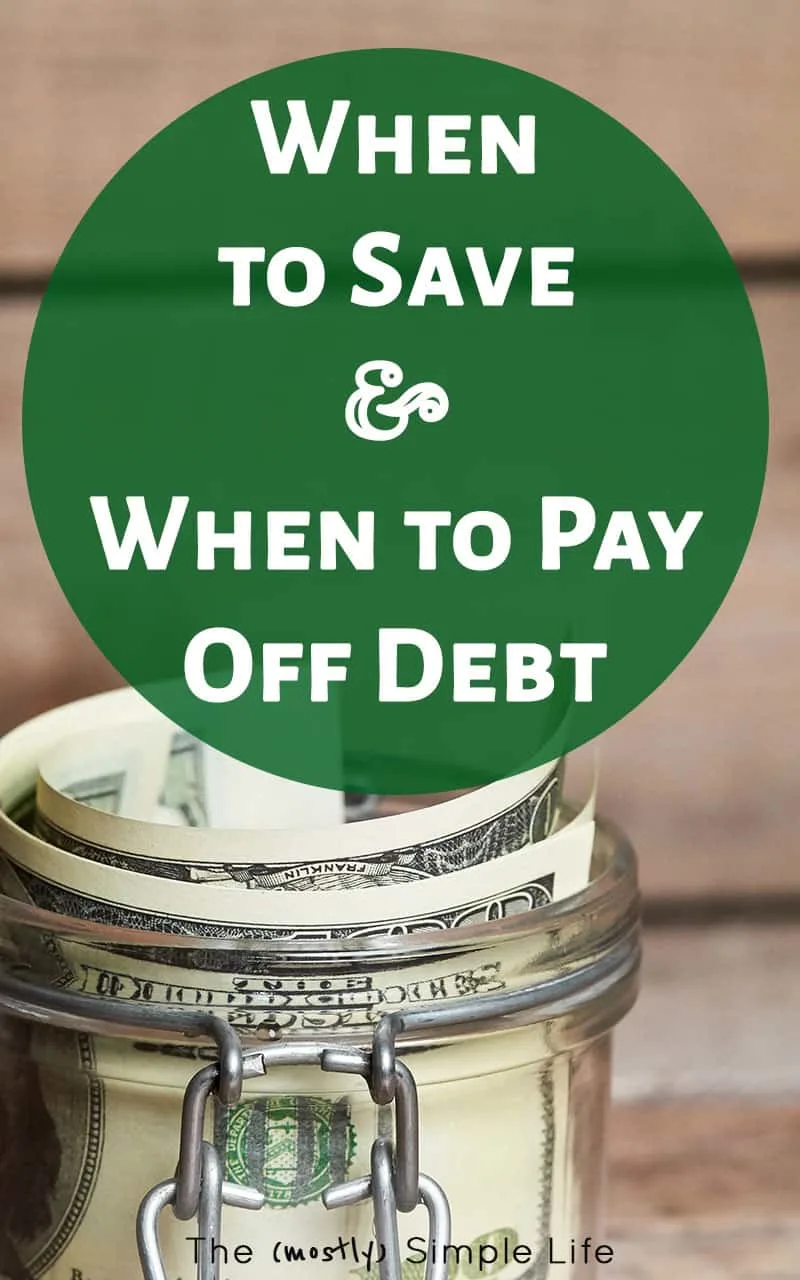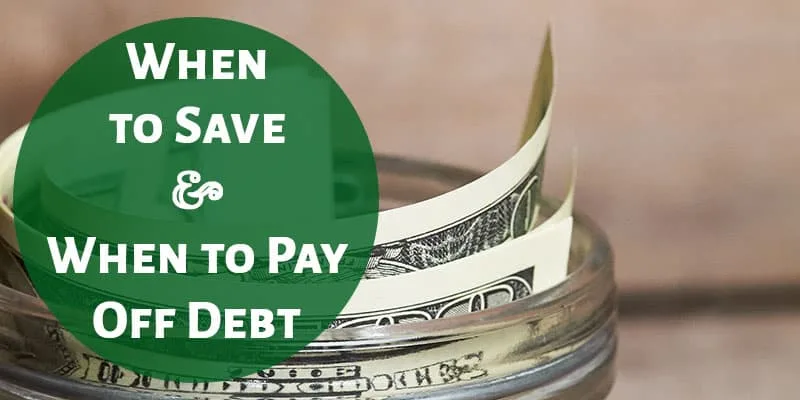It can be a bit confusing deciding exactly what to do with your money. Should you invest it all in retirement? Save it up in a savings account? Or pay off debt?
While there are good arguments for each of these options, I’m going to lay out the plan we use and how we think about what to do with our money.
When to Save and When to Pay Off Debt
First Things First
Before deciding whether to save extra money, pay of debt, or maybe invest, it’s important to have a small emergency fund stashed in a savings account.
It’s important to have this small emergency fund saved up before you do anything else because if you have some kind of emergency (unexpected car repairs, family illness, job loss…) you’ll be able to use the money you have saved instead of going further into debt. It acts as a buffer between you and the unexpected.
If you follow Dave Ramsey, he recommends that you have a $1000 mini emergency fund before you dive into paying off all of your debt. I prefer having a little more security than that. $1000 generally doesn’t go very far if you have an emergency.
I recommend having more like 1-3 month’s worth of expenses saved up. This doesn’t necessarily mean 1-3 month’s worth of income. You might have an income of $3000 per month, but when it comes down to it, you really only need $2300 per month to pay the bills and keep everyone fed.
Ideally I’d save up a 6 month emergency fund, but saving that much money will take a long time and keep us from paying off our debt for too long. That’s why we stick to a smaller emergency fund at first.
Now What?
After saving up a small emergency fund of 1-3 month’s worth of expenses, I’m firmly in the camp of paying off all debt except for your house. Each debt means that we have higher expenses each month and less money to work with to save or invest.
Right now we have a monthly car payment that’s $175. I’m working hard to pay off our car because it will free up $175 every month for us once that debt it gone!
Think about all of the debt payments you make every month: credit cards, vehicles, student loans… What’s the total amount you’re spending each month on debt payments? Think about what life would be like each month if that money was yours to keep!
While you’re paying off debt, it’s important to keep yourself from going into more debt. If something comes up, take a quick break from your extra debt payments and save up for it. If it’s an emergency, use your emergency fund and then replace the money in your emergency fund before moving on with the debt payments.
Investing While Paying Off Debt?
Dave Ramsey’s method recommends that you stop all investing while you pay off debt (this includes retirement 401K investments). His reasoning is that you’ll get out of debt faster if you’re throwing every bit of your income at debt.
While I totally understand that thought, I think it depends on how much extra money you have each month to pay off your debt.
If your budget is so tight that you barely have $5 left over at the end of the month, then it definitely makes sense to free up the money going into retirement so that you can get some traction.
If you have enough money left over each month to make good progress in paying off debt, then I think it makes better long term sense to contribute some money to investments, though maybe not as much as you’d like.
Also, if your employer offers a 401K match, then I wouldn’t want to miss out on that because it’s basically free money.
Right now we’re contributing 7% to Austin’s 401K, which still leaves us money left over each month to pay toward debt. I have a Roth IRA that I have paused contributing to for the moment.
Investing Instead of Paying Off Debt?
A lot of people like to get technical with not paying off debts with lower interest rates (like maybe a student loan) because investments could earn you more money than what you would lose. It can be a matter of preference, but I like to keep our expenses as low as possible for more financial security and peace of mind.
Having $10,000 in investments earning 8% does me no good if I have a job loss and can’t touch that money. I’d rather have paid off the car with the 4% interest rate and gotten rid of that monthly payment completely.
Once we have all of our debt paid off, we will then focus on saving more money into our emergency fund until we have 6 month’s worth of expenses saved up. At that point, we’ll save more aggressively for retirement and look at other options like paying off our hosue.
We’ve found that we have a lot more peace of mind and financial security by following this general plan.
Our small-ish emergency fund might not be as big as I would like, but it does help to keep us from going further into debt. By focusing on paying off debt next, we free up more and more of our income to be used for savings and retirement.
⇒ How do you handle deciding when to save and when to pay off debt? What debts are you working on paying off right now?


